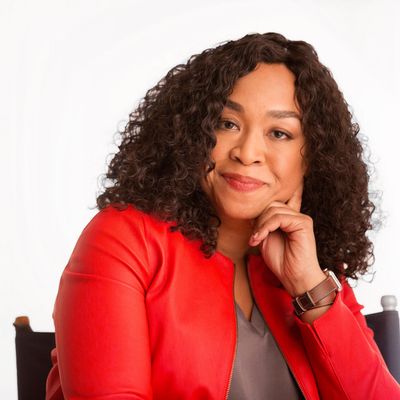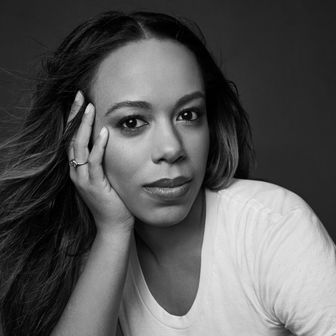
We know a great deal about Shonda Rhimes already — that she’s a mom of three, that she spent a year saying yes, and that — to not mince words — without her Thursday-night television would be kind of a bore. And yet Rhimes prods us to discover more. She has thoughts on rectifying self-doubt with self-confidence, on how society crafts an unfair definition of beauty, and on why, by the way, she thinks she looks pretty fantastic. She chose an unlikely (or is it likely?) source to channel this energy: Dove.
As creative director of the newly-formed Dove Real Beauty Productions, the video arm of soap brand’s body-positive marketing campaign that’s drawn praise — and criticism — she gets to explore what beauty means to women. That’s how I came to meet with Rhimes in early May, where we discussed what irritates her the most in how beauty discussions are framed, the lack of self-confident role models, and why she’s the Blue Ivy of her family.
What bothers you the most about the conversations surrounding beauty?
There’s something a bit wrong with a system that says only some of us get to be beautiful; that there’s only one kind of beauty. Somebody somewhere got to decide that this thing is beautiful, and you know it wasn’t a woman. What I find beautiful isn’t necessarily what you would call standard, and I don’t think everybody finds that beautiful. When I look in the mirror I don’t think to myself: “Oh I wish I looked like that.” I think I look pretty fantastic, which I feel great about because that’s some hard work on my part — and — for all women. There’s a power in that.
Have you always felt that you looked fantastic?
No. The idea that you can look at yourself in the mirror and say, “I look great” feels strange. Someone pointed out to me that women never allow people to say nice things about them without finding a way to downgrade what’s been said. Try saying to somebody else: “I am so beautiful.” Try saying it without thinking to yourself: They’re going to think I’m crazy, they’re going to think I’m a fraud. When I look at my daughters, I want them to say: “I am so beautiful, I am so smart, I’m so amazing.” They should be able to say that and it should feel true to them.
When did that start happening for you?
Maybe five or ten years ago. I started realizing how much I was not doing because I wasn’t allowing myself to feel beautiful, interesting, smart, powerful.
Is there a place within yourself where you drum up this self-confidence?
I was very fortunate. I was raised with a very powerful mother and a very amazing father, and my parents are very much the people who always thought I was the greatest thing in the world. I always joke that I’m the Blue Ivy of my family because I have five older brothers and sisters and anything I did was widely applauded. You have to grow up truly believing that all the time, and something happens to girls when they become teenagers where it gets sucked away. Having that well to draw from from the beginning does help. Once you can see the problem it’s really hard to unsee it. Once I could see what that was, I couldn’t go back.
What brings you joy within the world of beauty?
The unexpected. The girls who traditionally look like supermodels who are really goofy. The women who are much older who have so much going on in their faces and in their movement and in their clothes, that you think: “I can’t wait to be 70.”
What do you want women to know when it comes to how they should perceive their self-image?
The only definition [of beauty] is the definition they give themselves. That’s it. Anything anybody else has to say about you is absolutely irrelevant, and you learn that as you get older. I wish I had known that at 20.
Do you have any role models you look up to when it comes to valuing yourself?
No, and that’s part of why we wanted to do this whole campaign. Seriously. The Dove Real Beauty idea comes from the idea that if we put these real women out there, you will look on these screens and see women who look like you, telling stories that are some nugget of truth of what you’ve lived through. That will make you go: “I’m like that and they’re up there and they’re feeling beautiful. Maybe that’s me.”
What brought you to Dove in the first place?
I’m not really interested in getting involved with a product just to get involved with a product. What Dove does so beautifully is portray women as they really are. They’re pretty much one of the only brands that’s not telling you what’s wrong with you and then telling you how they’re going to fix it. You know, the idea that, “You have wrinkles, here’ something to fix it;” “You have age spots, here’s something to fix it;” “You’re ugly and here’s the product to help you.” Dove is really about: “You’re beautiful and let’s celebrate it.” That’s a little bit revolutionary.
This is a natural extension of what I’m doing on the shows. I’m not trying to portray a world that’s not real. I want real women to feel real women exist in the world and that they can be seen. Dove is accomplishing that with me, and feel like we’ve done something amazing.
This interview has been edited and condensed.





